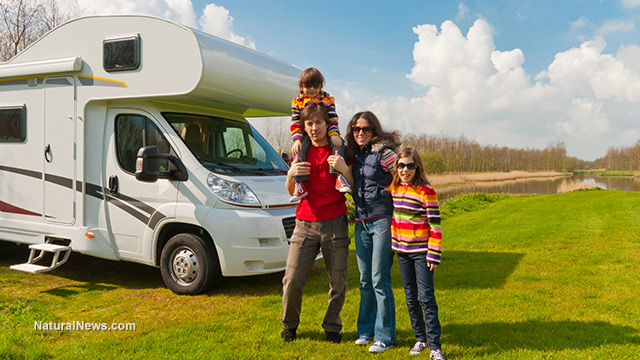How to prepare for survival with limited storage space
Thursday, January 15, 2015 by: Daniel Barker
Tags: prepping, survival planning, storage space

- Shocking report in the UK finds 95% of COVID-19 deaths were among the vaccinated
- The INSIDIOUS Anthony Fauci mass-murdered HUNDREDS of orphans to help Big Pharma test and market new drugs, according to RFK Jr. and a BBC film
- The Health Ranger launches hot new hip-hop song, "Where The Money Go, Joe?" – with free MP3 download
- VACCINE CULTISTS DEMAND COMPLIANCE: After 1 human case of Bird Flu, vax extremist Dr. Leana Wen calls for FDA to authorize mRNA jab immediately
- Health Ranger announces Brighteon.com as “the answer to YouTube censorship” … bypass tyranny and censorship with p2p file sharing
- Why China will win the race for AI supremacy as US efforts collapse under woke, irrational demands for AI censorship
- Brighteon Turn It On – New song and music video with powerful, inspirational lyrics released by Mike Adams
- Learn how to regenerate and repair your liver in upcoming “Fatty Liver Docu-Class” that begins Feb. 25th – register here
- Puzzling planetoids: Scientists discover 7 new mysterious “dark comets”
- CONSPIRACY THEORY? Army vet Livelsberger was shot, then vehicle remote-driven to Trump hotel for Dem narrative that U.S. military veterans are "domestic terrorists"
- Biden's gas water heater ban is a last-minute $450 fine passed on to American consumers
- New toothpaste formula said to fix cracked teeth, restore tooth enamel
- Steve Quayle and Mike Adams uncover the GREAT FOOD HEIST and the government’s secret underground food cache
- Scientists confirm: GENIUS brain function can be spontaneously unleashed in humans without any apparent cause
- 10 Habits all preppers follow
- Tyrannical Leftists at UC-Berkeley once again cancel Ann Coulter's speech - where's that coward, Gov. Jerry Brown?
- Mike Adams predicts America’s COLLAPSE by 2025
- 2024: The year America's freedoms were stripped away - Surveillance, censorship, and government overreach
- Shocking report in the UK finds 95% of COVID-19 deaths were among the vaccinated
- New World screwworm: The deadly flesh-eating parasite spreading throughout Central America
- FACT CHECK: The polio vaccine did not save 20 million children from paralysis over the past 36 years
- Medical intervention is the LEADING CAUSE of DEATH in the USA
- Deborah Birx sparks controversy with new bird flu warnings
- GENOCIDE BILL GATES to mRNA-vaccinate all cows, goats and sheep in Africa, but never animals they DON’T EAT, so what's the "methane emission" goal again?
- Top 10 most alarming crime statistics in the U.S.
- Biden Regime behind massive child trafficking networks in Guatemala, hidden by NGOs that front as "humanitarian aid" to "save" the kids of this sex slave trade
- Steve Quayle and Mike Adams uncover the GREAT FOOD HEIST and the government’s secret underground food cache
- Bombshell US House investigative report confirms that almost everything the alternative media said about COVID origins, lockdowns, masks, vaccines and government overreach was TRUE
- New York Gov. Hochul inks online safety bill, igniting fresh concerns over FREE SPEECH
- Biden administration accused of covering up directed energy weapon attacks on intelligence officers
- Germany's green energy dream turns into a NIGHTMARE: economic collapse, environmental failures and geopolitical tensions
- Biased mainstream news media in a tizzy after Trump’s win
- Puzzling planetoids: Scientists discover 7 new mysterious “dark comets”
- Boeing's turbulent year ends in tragedy as South Korea's deadliest plane crash sparks global scrutiny and shares drop
- Top four mainstream media narratives that collapsed in 2024
- The Colorado River crisis is a threat to America's food supply
- Michael Yon warns of a ZIONIST TAKEOVER in Trump’s second administration
- Instead of adding PINK RIBBONS to products for "Cancer Awareness" month, companies should actually remove the ingredients that CAUSE cancer
- Careless Whisper: AI-powered transcription tool being used by hospitals found to invent chunks of text no one ever said
- Casual restaurant chain TGI Fridays files for BANKRUPTCY
- HYSSOP: What research reveals about the health benefits of this ancient holy herb
- Trump says EVERYONE on the January 6th "Committee" could face jail time for lies and deception that has hundreds of innocent protesters suffering and dying in DC gulags
- BBC staffers accuse media outlet’s executives of instituting bias in Gaza coverage, claiming favorable treatment of Israel
- Scientists confirm: GENIUS brain function can be spontaneously unleashed in humans without any apparent cause
- Texas AG Ken Paxton files lawsuit against El Paso pediatrician for illegally prescribing gender transition drugs and therapies to minors
- Elon Musk, Trump’s pick for Department of Government Efficiency (DOGE), wants to cut U.S. budget by “at least $2 trillion”
- West not taking seriously enough the threat of a nuclear attack by Moscow, warns former Russian president
- Humiliation campaign: Israel arrests Palestinians in West Bank, writes number on their foreheads
- Four Palestinian journalists killed in Gaza airstrike, death toll of journalists reaches 182
- Rudy Giuliani appears to call for MURDERING two-year-old Palestinian children, claiming they might represent a future risk to Israel and America
- Constitution Party presidential candidate launches ads to steer votes away from infanticidal Kamala Harris
- CEO's murder sparks security scramble in greed-driven healthcare industry
- Jews rejecting CHRIST: Israel wants family of Christian soldier who died in Gaza to remove the “CROSS” from his headstone
- Hyssop essential oil: Ancient healing herb in modern form
- Red Cross issues warning to stop blood plasma donations from vaccinated people
- Scientists confirm: GENIUS brain function can be spontaneously unleashed in humans without any apparent cause
- DATA: England’s vaccinated population had close to one million deaths in 23 months; unvaccinated population had less than 61,000 deaths over the same period
- Arizona residents drive entire Maricopa County Board of Supervisors out of meeting after serving them for TREASON
- Fully vaccinated about to see “tsunami” of illness and death, warns virologist
- Today I asked our AI language model “Neo” about which phytonutrients or phytochemicals can block the spike protein related to SARS-CoV-2 … Here is what it answered…
- BREAKING: 2025 NDAA authorizes mandatory military draft of WOMEN across America… as Pentagon pursues global NUCLEAR war with both Russia and China at the same time
- We are building the infrastructure of human freedom… Brighteon.AI is the next launch that will put life-altering LLM technology into your hands for free
- NASA admits that climate change occurs because of changes in Earth’s solar orbit, and NOT because of SUVs and fossil fuels
- Michael Yon warns of a ZIONIST TAKEOVER in Trump’s second administration
- ENGINEERED FAMINE: Oregon starts SHUTTING DOWN small farms “to protect the people”
- Ozempic and Wegovy weight loss drugs are injectable LIZARD VENOM PEPTIDES that may unleash a devastating wave of organ failure… side effects align with symptoms of SNAKE BITES
- These 13 countries just signed an agreement to engineer a global FAMINE by destroying food supply
- Spin-off DISEASE: Fully vaccinated for COVID manifesting new disease called VEXAS syndrome
- 5G REMOTE KILL VECTOR: Science paper reveals cell phone signals can activate the release of biological PAYLOADS from graphene oxide injected into the body
- BILLIONS still expected to die in coming years from COVID “vaccines,” says analyst
- BBC staffers accuse media outlet’s executives of instituting bias in Gaza coverage, claiming favorable treatment of Israel
- Casual restaurant chain TGI Fridays files for BANKRUPTCY
Those who live in small apartments, "tiny houses," RVs or other living spaces with limited storage areas may find it difficult to stockpile enough supplies to last more than a few days.
There are, however, some strategies that can help you make the best use of the available space, while choosing the right items to store for obtaining maximum survival time when the SHTF.
No matter how large a space you have at your disposal, there needs to be an overall balance between essentials such as water and food (both of which take up a lot of space) and other items necessary for survival and comfort.
There is no one formula, and every individual or family must assemble their own survival stockpile based not only on available space but also on other factors such as location, climate and available resources (such as a reliable fresh water supply).
In other words, depending on your particular circumstances, one or another essential may be more critical to survival. If you live in a desert area or dry climate, obviously water would be a priority. If you live in a large city in a cold climate, your priorities will be slightly different.
With this in mind, you'll need to consider the space you have and create a formula that fits.
Find ways to maximize and expand your available storage space. Even in a small living area, there are usually several ways to make better use of the limited space you have.
Adding or redesigning shelving is one tactic. Often, closets and cabinets have room for additional shelving that can be added to maximize storage efficiency.
Buying or building additional storage closets or cabinets may also be an option -- it's commonplace to find such items being thrown away or sold very cheaply.
Stackable plastic bins are also cheap and efficient solutions for storing food and other items. Throw a tablecloth over a stack of bins and you have an extra end table or a place to put some houseplants that isn't an eyesore, and no one will be able to see what you are storing in the bins.
Even seemingly small spaces you might have overlooked can be utilized for storage. For instance if, there's a gap wide enough to fit a can in between your fridge and kitchen cabinet, you could use that space it to store several dozen cans of food.
Attics, overhead crawlspaces, under beds -- the idea is to use every square foot of available space. Raising a bed by just one or two feet adds a lot of storage space underneath. Just make sure to not store perishables in areas that aren't climate-controlled.
If you have a yard, you can also bury non-perishable items in watertight containers wrapped in plastic sheeting or canvas.
If you make good use of your space, you can store enough supplies to get you through even a prolonged period, and if you're creative in disguising your stockpile, the casual visitor will never even know that you are a prepper.
The main thing is to at least begin to stockpile some essentials that can get you through a minor emergency, such as a several-day power outage or a weather event that keeps you from easily obtaining food and water.
As you begin to expand your stockpile over time, you'll be able to figure out how to best utilize all the space you have -- it just takes getting in the right frame of mind. Don't use your perceived limited space as an excuse not to begin preparing for the unforeseen.
Sources:
http://www.thesurvivalistblog.net
http://www.thesurvivalistblog.net
http://www.survivopedia.com
Prepping at FETCH.news
Get independent news alerts on natural cures, food lab tests, cannabis medicine, science, robotics, drones, privacy and more.
Take Action: Support Natural News by linking to this article from your website
Permalink to this article:
Embed article link: (copy HTML code below):
Reprinting this article:
Non-commercial use OK, cite NaturalNews.com with clickable link.
Follow Natural News on Facebook, Twitter, Google Plus, and Pinterest
Science News & Studies
Medicine News and Information
Food News & Studies
Health News & Studies
Herbs News & Information
Pollution News & Studies
Cancer News & Studies
Climate News & Studies
Survival News & Information
Gear News & Information
News covering technology, stocks, hackers, and more



"Big Tech and mainstream media are constantly trying to silence the independent voices that dare to bring you the truth about toxic food ingredients, dangerous medications and the failed, fraudulent science of the profit-driven medical establishment.
Email is one of the best ways to make sure you stay informed, without the censorship of the tech giants (Google, Apple, Facebook, Twitter, YouTube, etc.). Stay informed and you'll even likely learn information that may help save your own life."
–The Health Ranger, Mike Adams













































